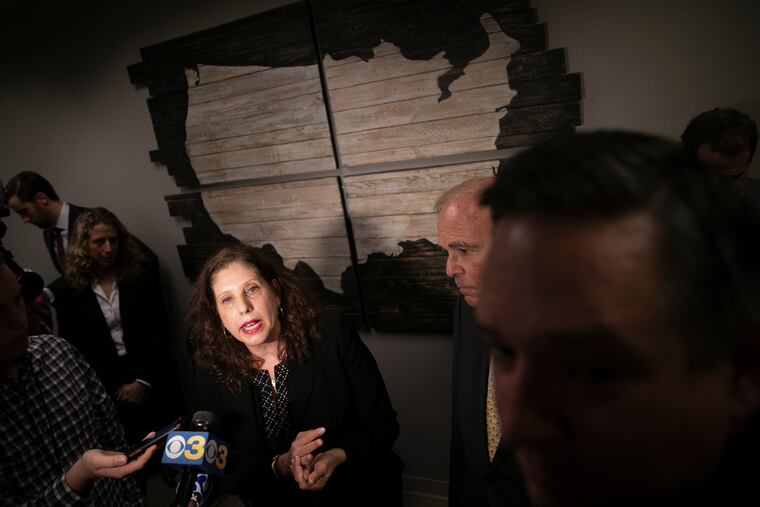Relocation is not an option for Philly supervised injection site | Opinion
No Philly neighborhood wants a "safe" injection site in their backyard.

On Feb. 25, District Court Judge Gerald McHugh, an Obama appointee, finalized his decision concluding that facilities that allow the supervised injection of illegal drugs do not violate federal law, paving the way for both an appeal and the opening of a Philadelphia “safe” heroin injection site. Locals immediately reacted, wondering just where this federal court-sanctioned drug den would set up shop. Most people assumed it would be in Kensington, a neighborhood known as the epicenter of the opioid crisis, and plagued by homelessness, unemployment, and crime.
Philadelphia Mayor Jim Kenney opined, “Our job as a city is to support efforts to alleviate suffering and to save lives.” In the name of compassion, and with the blessing of one activist judge, Safehouse, a Philadelphia nonprofit, has plowed ahead with its plan. Drug addicts may soon be able to inject under the watchful eye of monitors, standing ready to revive them in the event of an overdose (likely) and possibly steer them into some type of a treatment plan.
But Safehouse shocked the city with the announcement that they would open not in Kensington, but at Constitution Health Plaza at Broad and McKean Streets, in the heart of South Philadelphia. A day care, South Philadelphia High School, and scores of apartments and rowhomes are close by, along with many thriving businesses and the popular East Passyunk District.
At a rowdy press conference, the Safehouse founders realized that while Philadelphians have a history of tolerating urban chaos and inept leadership, plopping a drug den in the middle of a commercial and residential corridor full of working- and middle-class families will not be quite such an easy sell.
One woman, caught on video, unleashed a torrent of outrage about the plan foisted upon her and her neighbors with no warning, no transparency, and no community input. She channeled the outrage of an entire city.
Directed at the Safehouse founders standing a few feet away from her, including former Pennsylvania Gov. Ed Rendell, she shouted: “We had a meeting about crime, where were you? You were all silent because you snuck it in.”
“What about the mothers who have to walk by and step over the bags to take their kids to day care? Are you going to clean our outside? I don’t care about inside. I care about needles outside. I care about bags outside. I care about what my children have to see at 6 and 10 years old … that I have to explain hardened drug addiction. This is unacceptable, and you were a sneak about it.”
After the announcement, many local elected officials, who had previously tacitly approved of the Safehouse plan, have awakened from their slumber, apparently noticing the unchecked rage of their constituents. What might have been acceptable in Kensington is a bridge too far in South Philly.
Chad Pradelli of 6ABC reports that when he toured Toronto’s safe injection site, an apparent model for Philadelphia, he found the insides clean and a gateway to rehabilitation for users. Outside the site was a different story: illicit drug use and sales as well as other crimes, during and after the operating hours of the site.
What might have been acceptable in Kensington is a bridge too far in South Philly.
How soon would Broad and McKean be afflicted with such blight if a site were to open?
Fortunately, South Philadelphians don’t have to answer that question. Within days, Safehouse’s lease had been canceled and plans for all supervised injection sites have been put on hold.
The U.S. Attorney for the Eastern District of Pennsylvania, William M. McSwain, who has adamantly opposed the Safehouse plan since it was first introduced, still plans to do a swift appeal of the judge’s ruling. He has long maintained his intent to utilize available federal law enforcement options to keep the community safe.
Philly can take some comfort that McSwain has secured dozens and dozens of convictions and guilty pleas of drug traffickers and shady doctors, ferociously attacking those responsible for the proliferation of illicit drugs on our streets. Recently, his office secured convictions of three South Philly drug dealers who managed an around-the-clock opioid and heroin operation, delivering drugs on demand by call or text. McSwain realizes that attacking the opioid crisis requires attacking the supply chain. Further, he has remained consistent in his opposition, unlike many other local leaders who were willing to condone such a plan as long as it was palmed off upon an already devastated neighborhood with citizens unwilling or unable to voice meaningful opposition.
If Safehouse has no place in South Philly, why is it acceptable in Kensington or any other Philadelphia neighborhood? If these sites draw unchecked criminality, blight, and public health problems, no Philadelphian deserves that in front of their home.
Linda A. Kerns is an attorney and a cofounder of Broad + Liberty, where a version of this piece originally appeared. lkerns@broadandliberty.com @lindakernslaw